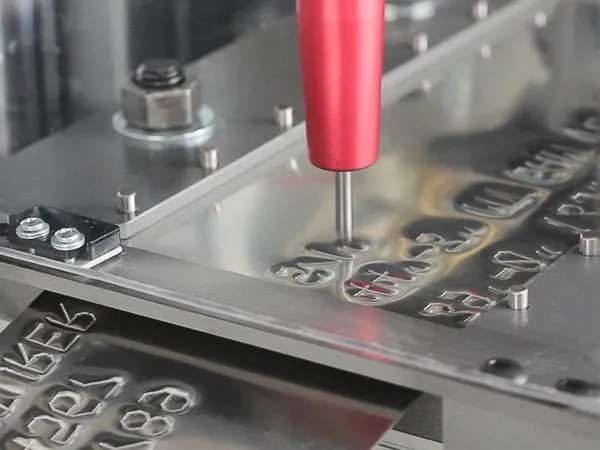Welcome to Cancard Inc’s Metal Tag Solutions page, your trusted source for metal tag embossing, marking machines, and industrial tagging solutions.

Durable, high-quality tags for industrial environments.
Precision equipment for consistent, long-lasting identification.
Customized solutions to track, manage, and secure your assets.
Whether you need manual or automatic embossers, or advanced options like 2D Data Matrix marking for high-level traceability, Cancard Inc delivers innovative, reliable, and scalable solutions tailored to your industry needs.
Metal tag embossers are machines designed to imprint raised or recessed text, numbers, and symbols onto durable metal tags. These tags are widely used for industrial labeling, asset identification, cable and pipe marking, military tagging, and compliance labeling in harsh environments. Unlike printed or sticker labels, embossed metal tags resist corrosion, abrasion, chemicals, and extreme temperatures.

Embossed tags withstand heat, chemicals, abrasion, and harsh environments, ensuring the information remains intact for years.

The raised characters are easy to read in dirty, oily, or low-light conditions, allowing quick and accurate identification.

Embossed tags provide permanent, tamper-resistant identification that meets industry standards for safety, quality, and regulatory compliance.

Tags can be tailored with serial numbers, barcodes, lot codes, batch details, and safety warnings to fit any application.

Stainless Steel Tags
Aluminum
Tags
Brass
Tags
Copper
Tags
Nickel Alloy
Tags
Short
Tags
LDAR
Tags
Pre-Printed Metal Tags
Info
Tags
Plant
Stakes
Pic Anneal
Tags
Kettle
Tags
Embed A Tags ID Tags
Dog
Tags
Round
Tags
Paint
Tags
Rectangular
Tags





















Produces sharp, clear text, barcodes, logos, graphics, and user-selectable fonts
| Feature | Embossers | Engravers | Laser Marking |
|---|---|---|---|
| Marking Method | Raises characters by pressing from the backside | Cuts or scratches characters into the surface | Uses a laser beam to etch, anneal, or discolor the surface |
| Depth of Mark | Raised and deep, highly visible | Shallow to medium-depth grooves | Very precise, shallow surface-level marking |
| Durability | Extremely durable; won’t fade with time or chemicals | Durable, but wear may occur in high-friction use | Highly durable but depends on surface treatment |
| Legibility | Easy to read in dirty or oily conditions | Readable but can fill with debris in rough environments | Crisp, detailed, and barcode/2D code friendly |
| Material Suitability | Works best on thin, ductile metals (steel, aluminum, brass) | Suitable for metals, plastics, and composites | Can mark nearly any material (metal, plastic, ceramic, glass) |
| Customization | Limited to characters, numbers, simple barcodes | Flexible with shapes, designs, and detailed text | Highly versatile—logos, barcodes, QR codes, graphics |
| Speed | Fast for bulk production of uniform tags | Slower compared to embossing | Very fast, especially for automated systems |
| Cost | Lower equipment cost; economical for high-volume tag production | Mid-range cost; requires more maintenance | Higher upfront cost, but low running costs |
| Automation | Available in manual or automatic models | Mostly semi-automatic or manual | Highly automated; integrates with software and production lines |
| Applications | Industrial tags, asset IDs, compliance labeling | Nameplates, trophies, machine parts | Electronics, medical devices, aerospace, traceability coding |

A metal tag embosser is a machine that stamps or engraves letters, numbers, or symbols onto metal tags for identification or tracking purposes.
Manual embossers require human operation for each tag, whereas automatic embossers process tags continuously with minimal user input.
Industries like oil & gas, aerospace, manufacturing, military, and utilities frequently use metal tag embossers for asset tracking and safety labeling.
Dot peen marking is used for creating permanent, readable marks such as serial numbers, barcodes, or logos directly on metal parts.
2D Data Matrix codes allow compact, high-density data storage for parts traceability, often used in aerospace and automotive industries.